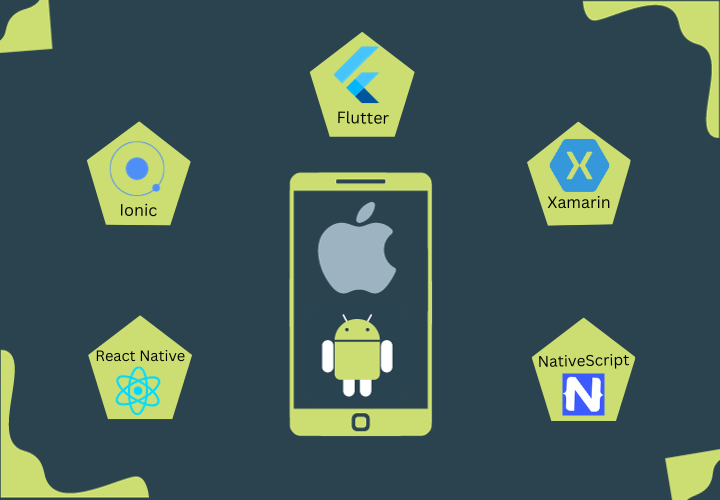
Do you know, in today’s fast-paced digital world, mobile applications are an essential part of our daily existence?
Mobile applications are the lifeblood of many of our daily activities, from ordering takeout and groceries online to organizing our daily schedules and maintaining connections with friends and family. Selecting a suitable mobile application development framework is essential to meet the growing demands of customers, companies and developers. Here, we will explore the world of mobile application development frameworks, their importance, and the top choices for producing cross-platform mobile applications in this blog post. This blog post can assist both seasoned developers and businesses seeking application development services in making well-informed decisions.
Here, we will examine the top frameworks for developing cross-platform mobile applications:
Before understanding the importance of frameworks for developing mobile apps, let’s check out some of the top options available in the market, as discussed below:
1- React Native:
- React Native was created by Facebook, and one of the most well-liked cross-platform frameworks.
- It is an excellent choice for web developers who know how to work with JavaScript and React, as it lets them create mobile apps.
- The component-based architecture of React Native offers a large selection of pre-built components and streamlines the development process.
2- Flutter:
- In the field of mobile app development, Flutter, developed by Google, is becoming increasingly well-known.
- With an extensive collection of configurable widgets and the use of the Dart programming language, developers can create aesthetically pleasing and incredibly efficient programs.
- Real-time code updates are made possible via Flutter’s ‘hot reload’ feature, which improves the development process.
3- Xamarin:
- Another potent framework for creating cross-platform apps, Xamarin is now a part of Microsoft. Because it uses C# and .NET, developers who are already familiar with these technologies will find themselves in a familiar environment.
- For creating apps that look and feel native, Xamarin provides an extensive collection of libraries and tools.
4- Ionic:
- Ionic is an open-source framework for creating cross-platform mobile applications that incorporate web technologies, including HTML, CSS, and JavaScript.
- The platform provides an array of pre-made user interface components and facilitates connection with well-known front-end frameworks such as Angular.
- Ionic guarantees a consistent and aesthetically pleasing user experience while streamlining the development process.
5- Native Script:
- Using JavaScript, Type Script, or Angular, developers can create fully native apps for iOS and Android with the help of the open-source Native Script framework.
- It offers native-like experiences on the web, iOS, and Android and gives direct access to all native platform APIs using JavaScript, Type Script, or Angular.
- While Native Script offers a cross-platform programming experience similar to its main competitor, its development methodology is more similar to the Ionic Framework.
Importance of Mobile Application Development Frameworks:
Let’s start with an examination of the importance of mobile application development frameworks before getting into the details. These frameworks serve as the building blocks for mobile applications. They offer developers a structured environment where they may use a single codebase to construct applications for many platforms, like iOS and Android. This method, referred to as cross-platform development, has several benefits, such as reduced costs, quicker development times, and preservation of a uniform user experience across various devices.
Companies that are looking for application development services often choose cross-platform options because they allow them to use a single program to reach more users. With the correct framework, developers may speed up the creation process, cut costs and time, and guarantee that the app works flawlessly across various devices.
Related Posts

What Is Long-Form Content and How Does It Work?
In the world of content marketing or digital marketing, long-form content has become increasingly popular in recent years as businesses…

Fintech App Development Guide for Startups and Financial Firms
Fintech app development has grown in popularity in recent years, with startups and financial firms alike looking to capitalize on…

Best Frontend and Backend Web Development Frameworks for 2024
As the web development services landscape continues to evolve, staying updated with the latest frameworks is essential for creating robust,…
